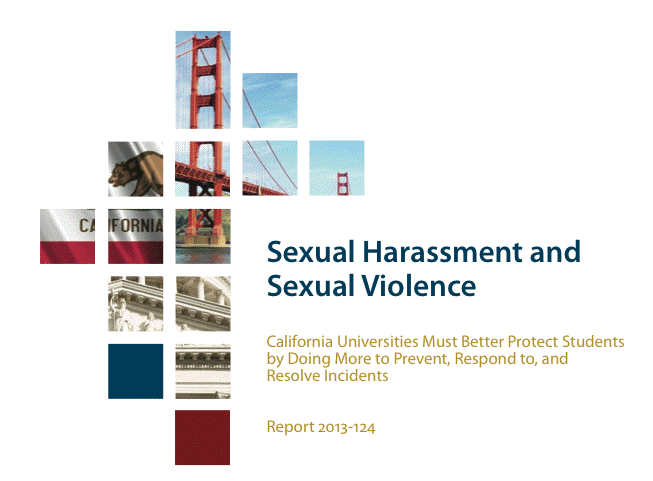A long awaited report by California State Auditor Elaine M. Howle has been released under the title: Sexual Harassment and Sexual Violence - California Universities Must Better Protect Students by Doing More to Prevent, Respond to, and Resolve Incidents
The study was undertaken at the request of the legislature and focused on UC Berkeley, UCLA, Cal State Chico and Cal State San Diego.
With respect to "the overall process" for responding to incidents of sexual harassment and sexual violence, the Auditor's conclusion was that the efforts of the institutions reviewed were "adequate."
The report concluded that faculty and administrators need more training, that students need more and better information, that the institutions take too long to respond to complaints, and that they need to do a better job of keeping students informed about the status and outcome of investigations.
Adequate, but less than satisfactory, the grade assignment for "overall process" might be a D+.
As to whether or not the institutions got the right answer, the Auditor's opinion was that "the universities generally brought incidents to a reasonable resolution."
The Auditor noted, however, that "by not ensuring that employees are sufficiently trained on responding to and reporting incidents of sexual harassment and sexual violence, the universities risk having their employees mishandle student reports of the incidents."
There was no indication in the report that these institutions performed in any exemplary way or that they did better than expected. The grade assignment for case decisions and outcomes might be a C or C minus.
News reports generally emphasized the failings. The headline from the San Jose Mercury News: "California university sex assault policies are lacking." From the Sacramento Bee: "Sexual violence training lacking at California universities." And from the Huffington Post: "California Auditor Finds Fault With Public Universities' Handling Of Sexual Assault."
UC Berkeley student Sofie Karasek voiced direct and specific criticisms in an Op-Ed for the Sacramento Bee: "Viewpoints: Universities need to take sexual assaults more seriously." Ms. Karasek was one of a large group of UC students who brought this issue to the forefront. In Berkeley, the Daily Californian charted their efforts, starting with an Associated Students no-confidence vote in April of 2013.
The Auditor's report did not serve to mollify critics or derail legislative action.
The Auditor's report did not serve to mollify critics or derail legislative action.
 |
Sofie Karasek (center) with Congresswomen Barbara Lee (far left) and
Jackie Speier (far right). Photo from the Daily Californian, Nathaniel Solley.
|
At the Federal level, Congresswoman Jackie Speier introduced the Hold Accountable and Lend Transparency (HALT) on Campus Sexual Assault Act on July 30th, with bipartisan support.
In Sacramento, Senators Kevin de Leon and Hannah-Beth Jackson introduced SB 967 (Student Safety: sexual assault) with Assemblymember Bonnie Lowenthal as the principal coauthor. SB 967 would require both public and independent post-secondary institutions to include specified provisions in their complaint investigation protocols.
 |
| State Senator Kevin de Leon with Senator Hannah-Beth Jackson (left) and Assemblymember Bonnie Lowenthal (right). |
As stated in the Bill: "Lack of protest or resistance does not mean consent, nor does silence mean consent."
SB 967 would essentially reaffirm that Universities are responsible for acting and imposing discipline, even if the behavior does not rise to the level of proof and intent required for a criminal conviction under the Penal Code.
The "affirmative consent" standard is controversial. The California Coalition Against Sexual Assault (CALCASA, founded in 1980) is a primary sponsor.
